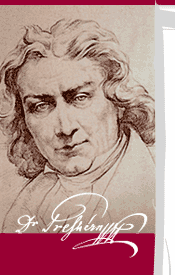| |
|
|
| 1843 |
New times, the Bleiweis era, the
authorities allow the publication of the Poems |
|
| |
|
|
 |
lovene society, or Carniolan as it was
then known, was gradually starting to change, but Prešeren
failed to notice this. Capable and, above all, hard-headed
national leaders came to the fore. This is particularly
true of Dr Janez
Bleiweis. In 1843, the young veterinarian started
up the newspaper Kmetijske in rokodelske novice (The Farming
and Crafts News), which firmly established him as the
leader of the national movement; everything else, including
the publishing of literature, took second place. Bleiweis
simply overlooked all the poetry Prešeren had written,
he did not even invite him to work alongside him at the
novice, which was, understandably, another blow to the
unfortunate poet. Prešeren wrote to Vraz: "No-one in the
Slovene world knows about me!" As far as Bleiweis the
editor was concerned, the most important poet was Jovan
Vesel Koseski, whose work he gladly published and whose
praises he kept singing. Some time later Bleiweis did,
however, publish Krst
pri Savici and a few other of Prešeren's poems, but
the two men were never able to establish a genuine and
useful relationship. Meanwhile, Prešeren's fourth and
fifth applications for his own legal practice were rejected,
understandably so. He had a very bad reputation; his police
record spoke of a very chaotic life, of drinking, lasciviousness
and bad habits, none of which were a good recommendation
for the respectable profession of lawyer. But his poetic
talent was not extinguished, quite the opposite. Zdravljica
(A Toast) and the wonderful elegy V
spomin Andreja Smoleta (In Memory of Andrej Smole),
which he wrote four years after his friend's death, were
created around this time (1844). He had quite a few problems
with Zdravljica; the court censor Fran Miklošič rejected
the third and fourth stanzas and Prešeren was not willing
to have it published without them. He waited another few
years and in 1848, after the Spring of Nations, he published
it in Bleiweis's Novice. The editor used our present national
anthem as a filler on the front page, below a text which
is today, like its author, forgotten. The last few years
of Prešeren's life were again poetically more fruitful.
He wrote Judovsko
dekle (The Jewish Maiden), Orglar
(The Minstrel), Od
železne ceste (About the Railway), V
spomin Matiji Čopu (In Memory of Matija Čop) and,
above all, Neiztrohnjeno
srce (The Preserved Heart), the poet's swan song.
Prešeren put a lot of energy into publishing the Poems.
He kept selecting and revising poems for the collection
and in 1846 he submitted the manuscript for censorship.
Fran Miklošič, the censor, was benevolent and had no problems
with Prešeren's selection, with the exception of Zdravljica
and one epigram. The printer Blaznik started working on
the publication and then things brightened up for Prešeren
even more. On the same day on which the go-ahead for his
Poems to be printed was given in Vienna - 22nd June 1846
- his application for a legal practice was finally accepted.
He had sent his sixth application for the posts available
in Postojna and Kranj, and the judicial authorities sent
him to Kranj.
|
|
| |
|
|
| |
|
|
    |
|
|
|
|


